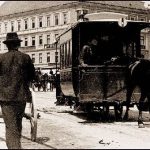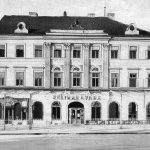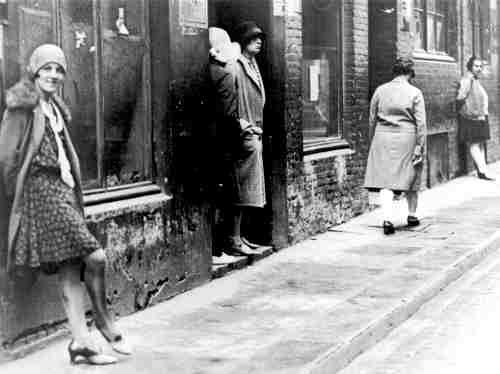
Did you know that back in the late 19th and early 20th ct Zagreb was one of the leading European cities when it comes to numbers of brothels? Almost every house in Tkalčićeva Street had one, with a red light marking its function.
The grandest Zagreb brothel was located at the corner of Tkalčićeva Street and Bloody Bridge, where the State Audit Office is located today, and it was called – Zlatna kuna (Golden kuna), just like the renowned award given by the Croatian Chamber of Commerce.
It all started with the first public steam baths which opened in the mid 19th century in Zagreb. In addition to caring for their health, the citizens of Zagreb had a great time at these baths. Inns and restaurants with diet food opened within the bath complexes, and a certain Mrs. Roža Aranjoš and her husband Vilim saw it as a great business opportunity.
They bought the worn out Petrova bath above Kožarska Street (Medvedgradska) and opened the first Zagreb bawdyhouse.
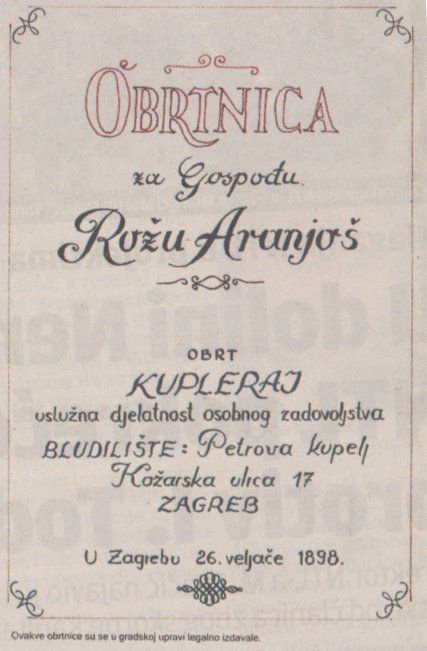
Photo: ladylike.hr
Prostitution was completely legal in Zagreb at the time. Croatia was part of Austria-Hungary and, allegedly, the Austrians told the city government: “As long as you pay taxes, we’ll allow any and all activity.” The certificate above states that the service that Madame Aranjoš’ trade will provide is that of “personal pleasure.”
The owner of the ‘concessions for women affairs’, the popular Madame Aranjoš, was only one of a dozen owners of upscale bawdyhouses next to the Medvescak stream.
The Zagreb mayor at the time decided to bring order to the ‘oldest profession’, and in 1899 the so-called Bawdyhouse rulebook was created. Its 31 articles dictated who could work at a bawdyhouse. In accordance with the rulebook, women over 17 could work there, while entrance was strictly forbidden for young men under 16.
46 bawds were registered in 1907 in Zagreb. Each of them was required to have an identity card with a photograph and see a doctor once a month for a medical examination. According to records, a team of ten doctors was in charge of taking care of their health. If one of them was discovered doing the job illegally, she would be banished from the city.
The bawdyhouse appearance was legally mandated as well – high fences and windows with opaque glass, in order to protect the visitors’ privacy.
However, even though it was regulated, the living and working conditions at the bawdyhouses were not great – the Madame would take ¾ of the profit, leaving the ladies with only ¼.
In addition to brothels, ladies of pleasure were available at certain bars as well, which had special booths with a bottle of champagne on the table. These bar prostitutes were up to five times more expensive than the street prostitutes (called štriherica or štajgerica), who could be found on the corners at Amruševa, Petrinjska and Palmotićeva Streets.
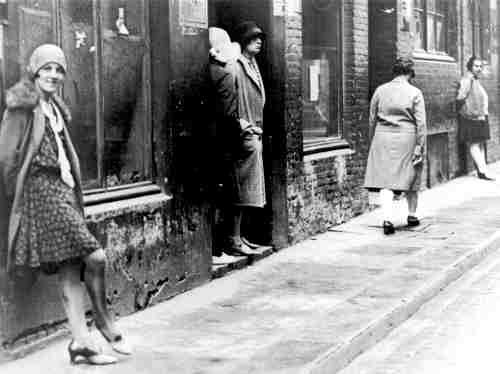
Photo: ladylike.hr
Some of the most popular bars included Pick (Ban Jelačić Square 6), with the best and most expensive programme and Klub (Ilica), with cabaret shows until 10 p.m. and music and dancing until 5 in the morning.
There were emancipated ‘ladies of pleasure’ as well, who became independent and opened trades at their own homes. One of the most famous independent prostitutes was located in Radićeva, and she had a very practical way of letting potential customers know whether she was occupied or not. She held a garden gnome on her window, which she would lay down if she was occupied, and set it upright if she was available. The angry women of Zagreb knew about this so they often threw rocks at it when they would walk past.
Some sources claim that the statue of Woman in the Window by Vera Dajhat Kralj in Tkalčićeva Street represents this tradition.
The men of Zagreb were able to enjoy the strictly controlled brothel services until 1934,when bawdyhouses closed, and the activity became illegal.
https://www.youtube.com/watch?v=ecfmH9AWXF8
Sources: ladylike.hr, zagrebancija


